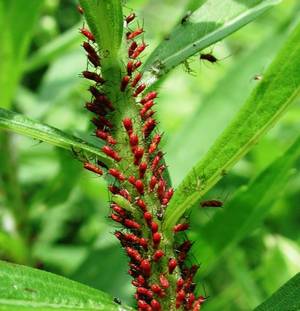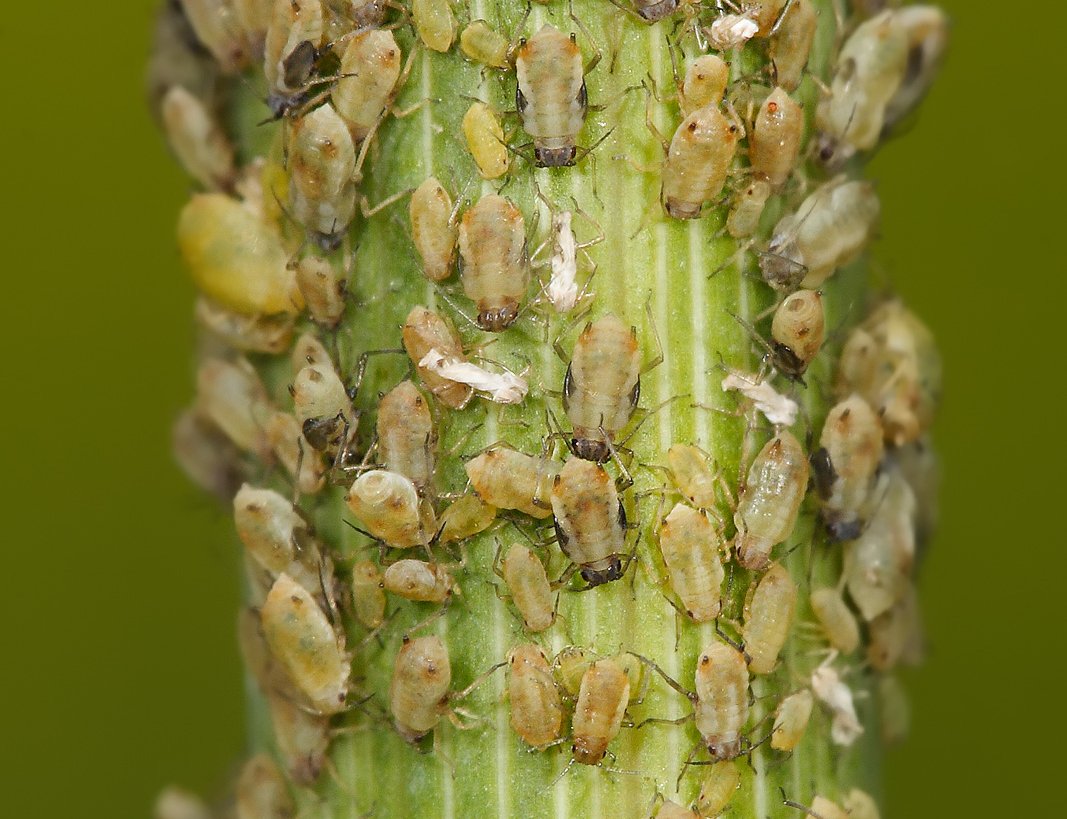Aphids and Pesticides
Interview with
Ben - Also in the news this week - an international consortium of Aphid researchers have been studying the newly decoded aphid genome, due to be published later this year, with a view to developing better pesticides that will not let the aphids develop resistance. Diana O'Carroll met Professor Lin Field and Professor Kim Hammond-Kosak at the British Science Festival to find out why the aphid, and pesticide resistance, is such a problem...
 Lin - The problem is that we need to control insect pests so, insects are pests of many of our crops and if we didn't control them, we would have a severe reduction in crop production, and at the moment when all the emphasis is on trying to grow more food, we need to make sure we can control pests effectively. The trouble is that when you control pests with chemistry for instance, the pests are kind of one jump ahead of you at some point and they develop a resistance to those chemicals and we have to find ways of either overcoming that resistance or managing it or designing better pesticides that will overcome resistance and also be more selective for pest insects rather than beneficial insects.
Lin - The problem is that we need to control insect pests so, insects are pests of many of our crops and if we didn't control them, we would have a severe reduction in crop production, and at the moment when all the emphasis is on trying to grow more food, we need to make sure we can control pests effectively. The trouble is that when you control pests with chemistry for instance, the pests are kind of one jump ahead of you at some point and they develop a resistance to those chemicals and we have to find ways of either overcoming that resistance or managing it or designing better pesticides that will overcome resistance and also be more selective for pest insects rather than beneficial insects.
Diana - Lin, we've got some species of some little aphids there, I think. Could you quickly give us a talk through them?
Lin - Yes, I can. Aphids are a very important crop pest mainly, because they carry various diseases- plant viruses. They can do some direct damage by feeding on young shoots but the most damage is done by vectoring viruses. And one of the most important pests is this aphid, the 'peach potato aphid' or Myzus persicae, to give its Latin name. This is a very important pest in the UK of potatoes, sugar beet, oilseed rape and we have quite a lot of problems with this aphid because it's developed a resistance to many chemicals. This other aphid here is actually the pea aphid or Acyrthosiphon pisum. And the reason I've brought that along is not because it's a very important pest but because this is the aphid where we now have a genome sequence. So we have a full genome sequence for this aphid and most of the genes in there seem to be very similar to genes in other aphids, and we are now able to use that information to look at the genes and the proteins involved in insecticide binding and try to devise ideas about making better chemicals to overcome resistance or perhaps to bind to the target protein in this aphid rather than in a beneficial like a bee. So, having the genome of this aphid is now helping us with new control measures for other aphids.
Diana - And Kim, just to come to you, could you explain a little bit more about how sequencing the genome can help us find those targets?
Kim - Yes, I mean, when you sequence a genome, first of all, you end up with just a long string of A's, C's, T's and G's. But it's when you actually look at that in the context of the genes and where the genes are situated in the genome then some patterns start to emerge-what genes are present, what are absent, which ones are different between the species, and then you can actually say to yourself, does this actually then affect the biology of the organism? Because our different pests and pathogens have different strategies to attack and cause disease and damage to plants, and then you can start to say that there might be some correlations between the presence of particular genes and the way in which they actually have the strategy of attack.
 Diana - Do you think that finding these targets will be the solution?
Diana - Do you think that finding these targets will be the solution?
Kim - I don't think there'll ever be a final solution. It means that you're almost on a staircase and what you do is, you successfully hop up each step and then it gives you a chance of actually controlling what is going on at the moment, learn from the mistakes, benefit from the gains, and then hopefully move to the next step when you've got more information and by sequencing, particularly in the failures, the strains that come through, what is selected each time and then learning from those.
Lin - And, I think for insects, the benefit of having genomes from a whole different range of different insect species which we're now beginning to get, it's going to allow us to look at the use of chemicals that will target one species because one of the problems with using insecticide has been that the use of it in crop pests has spilled over into damage to non-target pest, which is what we want to avoid.
Ben - That was Kim Hammond-Kosak and Lin Field from Rothamsted Research explaining how understanding the genome of an insect pest can help to develop new control methods that get around the problem of pesticide resistance.
- Previous Clever Corvids
- Next Mending a Broken Heart










Comments
Add a comment